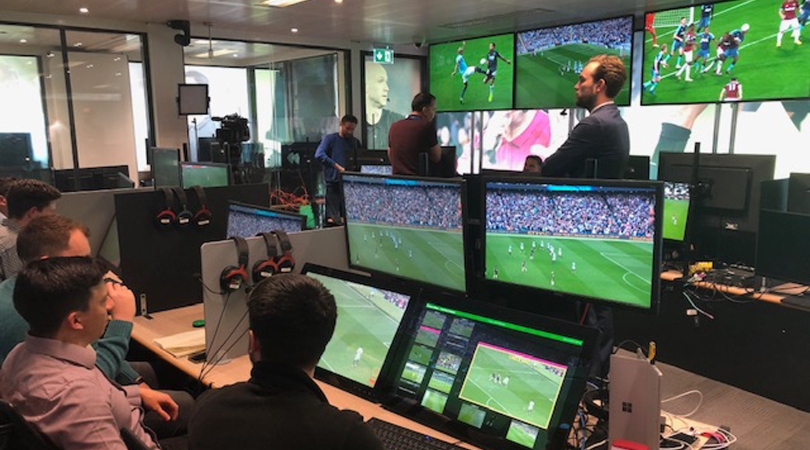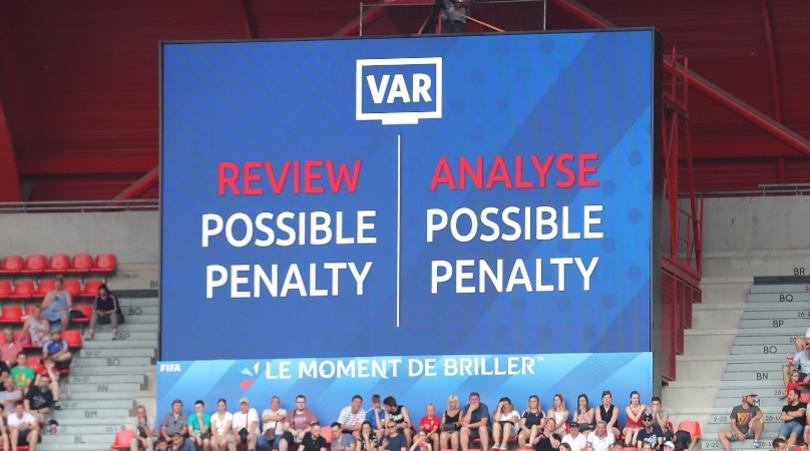How VAR will be used in the Premier League in 2019/20
Video replays have taken plenty of flak since their introduction, and this summer was no different - but how will the Premier League use the technology?

The 2019/20 Premier League season will be the first to use Video Assistant Referee technologies – but its rollout in the English top flight will be markedly different to the way it has been previously used.
After mixed trials in the FA Cup and Carabao Cup in 2018/19, the technology will now also be in place for league matches.
The technology has been ever-present this summer at various international tournaments, including the Copa America and Women’s World Cup, where it has been criticised for lengthy delays and excessive use.
Monday's Times reports that the Premier League has set out VAR guidelines in an attempt reduce over-reliance on the technology next season, and reduce the disruption during matches. Former Premier League referee Mike Riley, who is now head of Professional Game Match Officials Ltd (PGMOL), told the paper that VAR use in the Premier League will be minimised to try to avoid disruption.
“Where you have to be careful is to not use VAR to re-referee the game. You have to trust the people out there on the field of play as the players do.
“What you also don’t want to do, particularly in our game, is to disrupt the intensity or the flow of the match.”
Handball!
The best features, fun and footballing quizzes, straight to your inbox every week.
VAR’s ruling on handball has created a whole new level of confusion among players, managers and fans in recent months. The 2018/19 Champions League saw a number of high-profile handball decisions given through VAR, including PSG's Presnel Kimpembe against Manchester United and Tottenham's Danny Rose against Manchester City.
However, the Premier League interpretation will not be as strict and instead revert to a more famililar application based on whether or not there has been a deliberate attempt to block the ball with a hand. This would mean that goals such as the one England striker Ellen White saw disallowed on Saturday against Sweden would stand, and penalties such as the one given against Tottenham's Moussa Sissoko in the Champions League final would not be given.
Riley explained: “There are still areas of interpretation around the way the new handball has been written – effectively what you consider to be an unnatural position of hands and arms. In this country we have always said – and this is the players and managers saying it to us – that arms are part of the game and as long as you are not trying to extend your body to block a shot, then there is more scope so that we don’t penalise.
“What we don’t want to create is a culture when defenders have to defend with their hands behind their back or where it is acceptable for attackers to try to drill the ball at their hand to win a penalty.
Penalties
VAR will not be used to judge whether a goalkeeper is off their line unless a blatant mistake is made by the referee. This move was announced last month, after a number of retaken penalties at the Women’s World Cup - and could yet spark a showdown with FIFA.
The governing body's referee chief Pierluigi Collina has ruled out the notion of different countries making their own decisions on laws, saying: "The laws of the game are the same all over the world. What is written in the laws of the game has to be enforced in every (one) of the countries belonging to FIFA, and in every (one) of the competitions arranged by the member association of FIFA.”
Pitchside monitor reviews
In an interesting move, the on-pitch referees have been advised not to use the monitors except in exceptional circumstances. Pitchside reviews have meant lengthy delays and confusion in the stands, and Riley says that the controversies at the Women's World Cup led directly to this decision.
"We have said the referee should not go to the pitchside monitor unless the VAR’s decision is completely out from what he expects," he explained. “There have been examples at the Women’s World Cup, really subjective decisions, where it has taken three or four minutes and you can avoid all of that as long as the advice that the VAR has given you is something the referee expects.”
“Where you have to be careful is to not use VAR to re-referee the game. You have to trust the people out there on the field of play as the players do. What you also don’t want to do, particularly in our game, is to disrupt the intensity or the flow of the match.”
Gabriel Jesus will be happy to see the back of them.
Gabriel Jesus starting on VAR is a big Monday mood pic.twitter.com/cXUyIQGWfh— FourFourTwo (@FourFourTwo) July 8, 2019
Offsides
In line with how video replays have been used elsewhere, offsides will be judged even in the tightest calls - if an attacker has a toe ahead of the defender, they will be ruled offside.
Red cards
The technology will only be used if it is believed that the on-field referee has made a ‘clear and obvious’ error or sent off the wrong player - such as the 2014 Stamford Bridge mix-up that saw Kieran Gibbs given his marching orders rather than Alex Oxlade-Chamberlain.
This might be a difficult one for the on-field ref, as surrounding players may force them to review more decisions than they would like.
While you're here, why not take advantage of our brilliant subscribers' offer? Get 5 issues of the world's greatest football magazine for £5 – the game's greatest stories and finest journalism direct to your door for less than a pint in London. Cheers!
NOW READ
YOUTH EVERY Premier League club's breakthrough star of 2019/20
OPINION Why 2019/20 will spell the end for the Premier League top six as we know it
New features you'd love on FourFourTwo.com
 Join The Club
Join The Club






